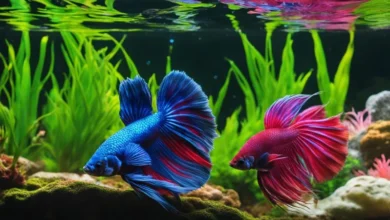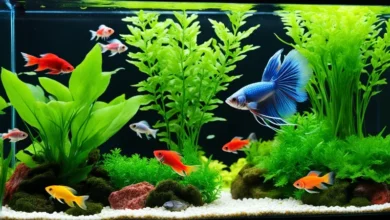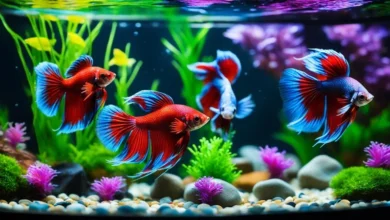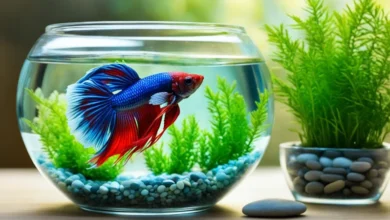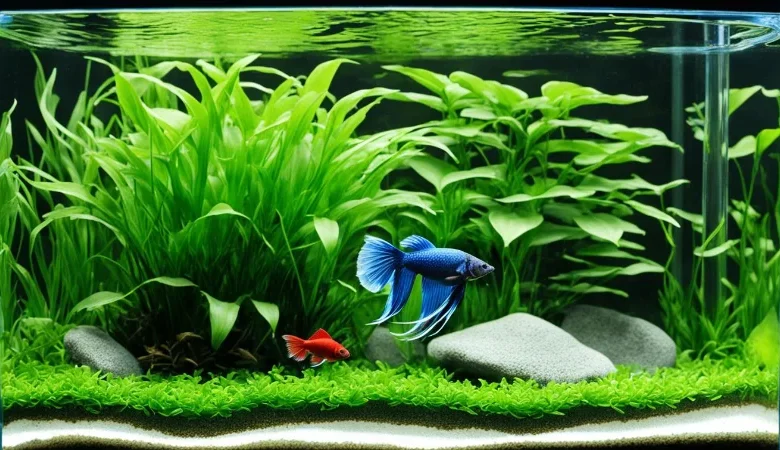
When it comes to keeping betta fish healthy, one of the most crucial factors to consider is the water quality in their environment. Betta fish are known for their vibrant colors and elaborate fins, but they are also quite sensitive to variations in water conditions. Understanding how to maintain Betta Water Quality is essential for the overall well-being and longevity of these beautiful and graceful creatures.
In this article, we will explore the importance of betta water quality and provide you with valuable tips to ensure your fish’s optimal health. So, dive in and discover the key elements to keep your betta fish swimming happily in pristine water conditions.
Housing and Tank Decorations for Betta Fish
Betta fish are beautiful and vibrant creatures that deserve a comfortable and stimulating environment to thrive in. When it comes to housing your betta fish, opting for a proper tank rather than a small bowl is vital to their health and well-being. A spacious 5-gallon tank or larger allows bettas to engage in natural swimming and hiding behaviors, promoting a happier and healthier fish.
However, it’s not just the tank size that matters; the choice of tank decorations is equally important. Betta fish are known for their inquisitive nature and love to explore their surroundings. When selecting tank decorations, keep in mind that they should not occupy too much space, allowing your betta ample room to swim around and investigate their entire habitat.
It’s also crucial to consider the safety of your betta when it comes to tank decorations. Avoid decorations with sharp edges or rough surfaces that can tear their delicate fins, leading to discomfort and potential injury. Instead, opt for soft, smooth decorations that won’t harm your betta’s fins while they navigate their tank.
To help you visualize the ideal housing and tank decorations for betta fish, take a look at the image below:
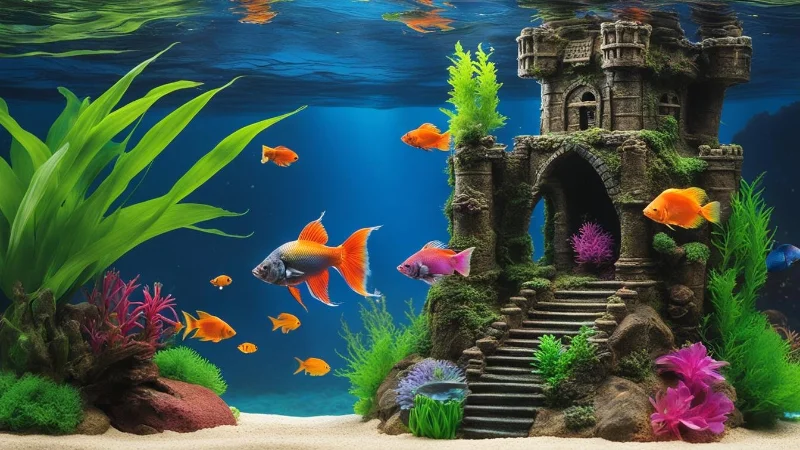
In this image, you can see a well-designed betta fish tank with suitable decorations. The tank is spacious, providing the betta with ample swimming space while the decorations are soft, colorful, and visually stimulating, offering the betta a comfortable and engaging habitat.
Betta Water Quality and Temperature
Keeping proper water quality and temperature is crucial for the health and well-being of betta fish. Betta fish are known for their vibrant colors and flowing fins, but they are also delicate creatures that require specific conditions to thrive. Maintaining a clean and suitable environment will help prevent stress, disease, and even mortality in these beautiful fish.
Water quality is a significant factor in ensuring the longevity of betta fish. When it comes to betta water quality, two key aspects to consider are filtration and regular water changes. A good filtration system will help remove any harmful particles and toxins from the water, ensuring a clean and healthy environment for your betta. It’s also important to test the water regularly for parameters such as ammonia, nitrite, and nitrate levels, as high levels of these can be dangerous for your fish. Regular water changes, typically around 25% to 50% of the tank volume, will help maintain optimal water conditions and minimize the accumulation of harmful substances.
Temperature is another critical factor in betta fish care. Betta fish are native to the warm waters of Southeast Asia, so they require a consistent temperature range of 78°F to 82°F (25°C to 28°C) to thrive. It is recommended to use a reliable aquarium thermometer to monitor the water temperature consistently. Fluctuations or extremes in temperature can stress and weaken betta fish, making them more susceptible to diseases. The use of a heater and thermostat is highly recommended to create a stable and comfortable environment for your betta.
In conclusion, betta fish care involves maintaining proper water quality and temperature. Regularly testing and adjusting the water parameters, along with using a good filtration system, are crucial for providing a clean and healthy habitat for your betta fish. Additionally, ensuring a consistent and suitable temperature range will help prevent stress and promote the overall well-being of your betta. By taking these steps to provide optimal conditions, you can enjoy the beauty and companionship of these magnificent fish for years to come.
Feeding Betta Fish
When it comes to the diet of betta fish, it’s important to provide them with a balanced and nutritious meal. Betta fish are carnivores, which means that their diet primarily consists of meat-based foods. These can include specially formulated betta pellets or flakes that are readily available in pet stores. These foods are designed to meet the specific nutritional needs of betta fish and provide them with essential vitamins and minerals.
It’s crucial to feed betta fish the right amount of food to maintain their optimal health. Overfeeding can lead to obesity and associated health issues. A good rule of thumb is to offer them only the amount of food they can consume within 3 to 5 minutes. This helps prevent food waste and ensures that they receive the appropriate portion size.
Additionally, it’s beneficial to provide betta fish with occasional high-protein treats. These treats can include bloodworms or brine shrimp, which are rich in protein and can enhance the nutritional variety in their diet. However, it’s essential to offer these treats in moderation, as excessive amounts can lead to digestive problems.
Betta Fish Tank Mates
Betta fish are naturally territorial and should not be housed with other betta fish. However, certain tank mates can coexist peacefully with bettas, adding variety and companionship to their environment.
1. Snails
Snails, such as Nerite or Mystery snails, can make excellent tank mates for betta fish. They help to clean the tank by consuming algae and waste, reducing the need for frequent maintenance. Snails are peaceful creatures that won’t bother the betta or compete for resources.
2. Ghost Shrimp
Ghost shrimp can be another compatible addition to a betta fish tank. They are small, non-aggressive crustaceans that serve as scavengers, eating leftover food and debris. However, it’s essential to note that bettas may view ghost shrimp as a food source, so keeping an eye on their interactions is important.
3. Certain Fish Species
There are a few specific fish species that can cohabitate with betta fish. Compatible tank mates include peaceful and community-oriented species such as corydoras catfish, neon tetras, and harlequin rasboras. These fish should be added in small groups to minimize stress and help establish a harmonious tank environment.
4. African Dwarf Frogs
African dwarf frogs can be fascinating and entertaining companions for betta fish. These small aquatic frogs are peaceful and spend most of their time swimming near the bottom of the tank. However, it’s crucial to make sure the tank size is adequate to accommodate the needs of both the betta fish and the frogs.
When introducing tank mates for betta fish, it’s important to research each species’ specific care requirements. Ensure the tank size is suitable, with ample hiding places and a proper filtration system to maintain water quality. Monitoring the interactions between the betta fish and their tank mates is essential to ensure the well-being of all the inhabitants.
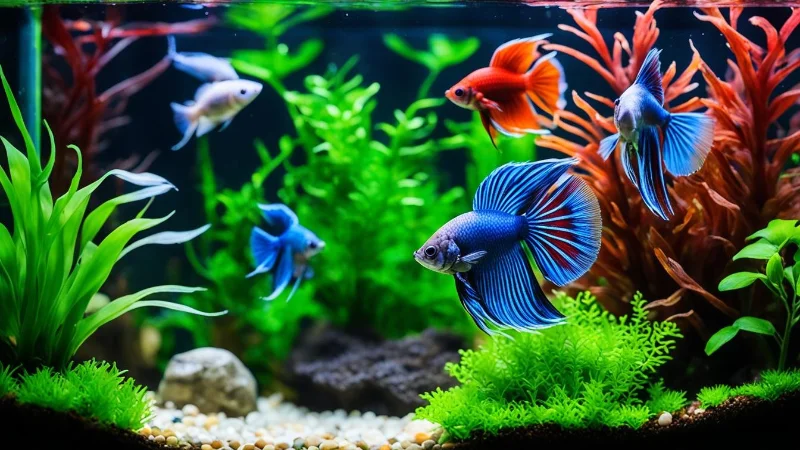
Additional Betta Fish Resources
When it comes to caring for betta fish, it’s important to have access to accurate and reliable information. There are numerous online resources available that can provide valuable insights into betta fish care. One such resource recommended by Dr. Krista Keller, a veterinarian, is Bettafish.org.
Bettafish.org is a comprehensive website dedicated to all things betta fish. It offers a wealth of information, resources, and answers to common questions that betta fish owners may have. Whether you’re a new betta fish owner or an experienced enthusiast looking to expand your knowledge, Bettafish.org is a valuable source of information.
The website covers various aspects of betta fish care, including tank setup, water quality, feeding, tank mates, and health issues. It provides step-by-step guides, helpful tips, and detailed articles to help you provide the best possible care for your betta fish.
At Bettafish.org, you can also find a community forum where you can connect with other betta fish owners, share experiences, and seek advice. It’s a great platform to interact with fellow betta enthusiasts and learn from their experiences.
Remember, when seeking betta fish information online, it’s crucial to rely on trusted sources like Bettafish.org. The expertise and knowledge provided on this website can help you make informed decisions and ensure the well-being of your betta fish.
Conclusion
As we come to the end of this article, it is important to emphasize the significance of maintaining betta water quality. The water in which our beloved bettas reside plays a crucial role in their overall health and well-being. By ensuring optimal water conditions, we are not only promoting a longer lifespan for our aquatic companions but also enhancing their vibrant colors and natural behavior.
Proper filtration and regular water changes are key factors in maintaining betta water quality. A high-quality filter will help remove harmful toxins, such as ammonia and nitrites while preserving the beneficial bacteria necessary for a balanced ecosystem. Additionally, performing routine water changes helps remove excess waste and replenishes essential minerals that may become depleted over time.
It is also crucial to monitor key water parameters, such as temperature, pH, and ammonia levels. Bettas thrive in water temperatures around 78-82°F (25-28°C) and a slightly acidic to neutral pH range of 6.5-7.5. Regular testing using accessible water testing kits will allow us to quickly identify any imbalances and take necessary action to rectify them.
In conclusion, the well-being of our bettas greatly depends on the quality of their aquatic environment. By implementing proper filtration, regular water changes, and monitoring key water parameters, we can ensure a clean and healthy habitat for our beloved bettas. Remember, a happy and thriving betta is a result of our commitment to maintaining optimal water quality.
